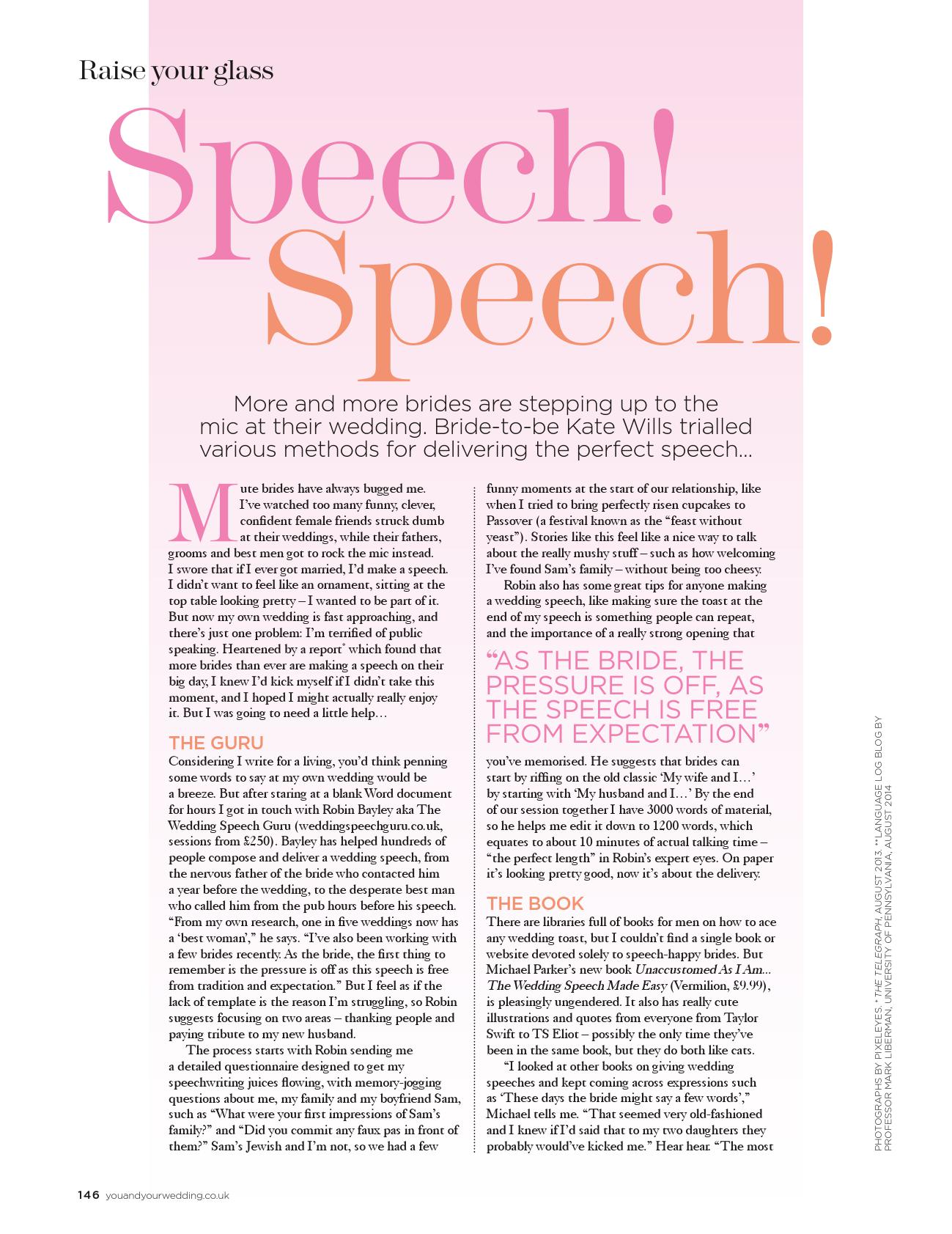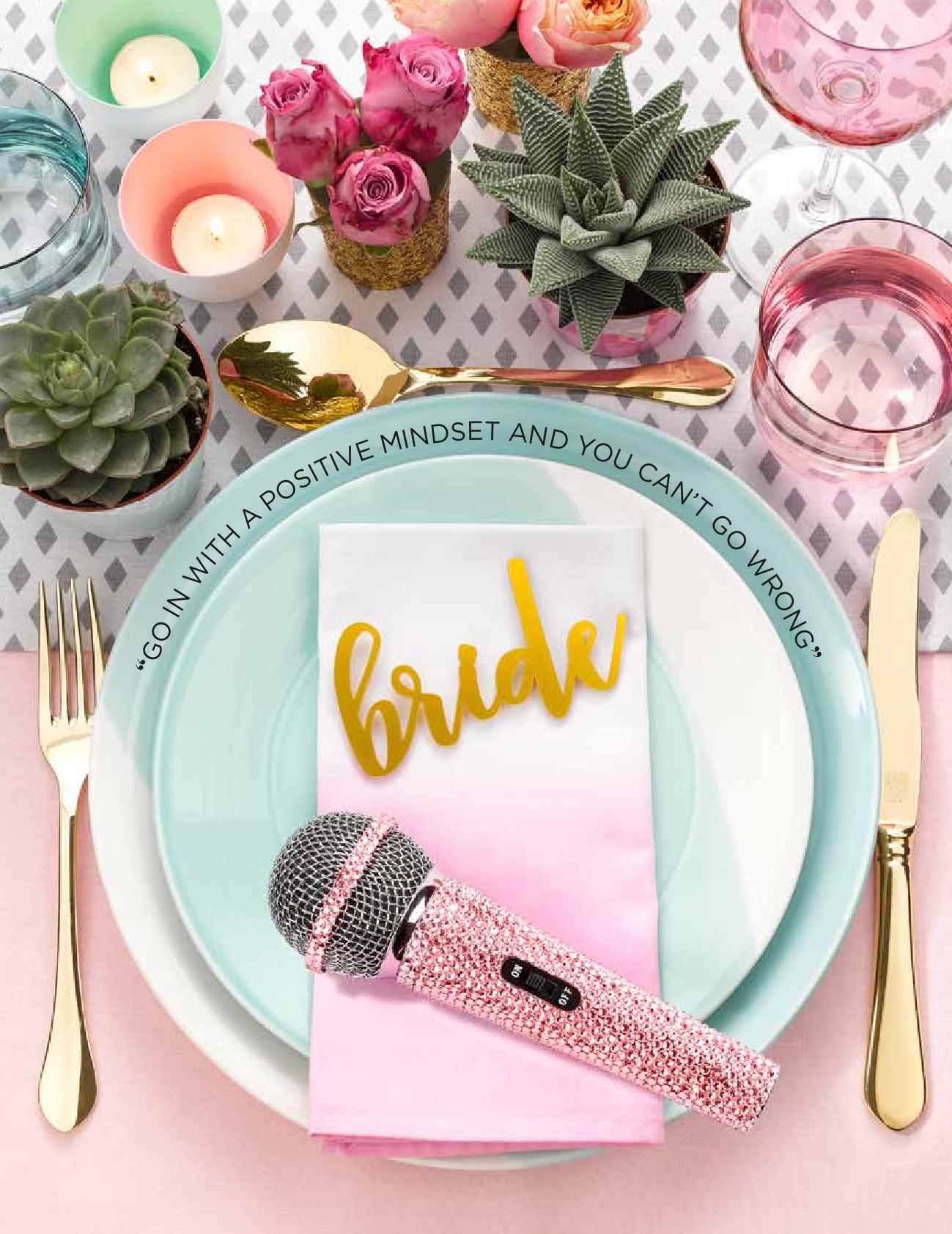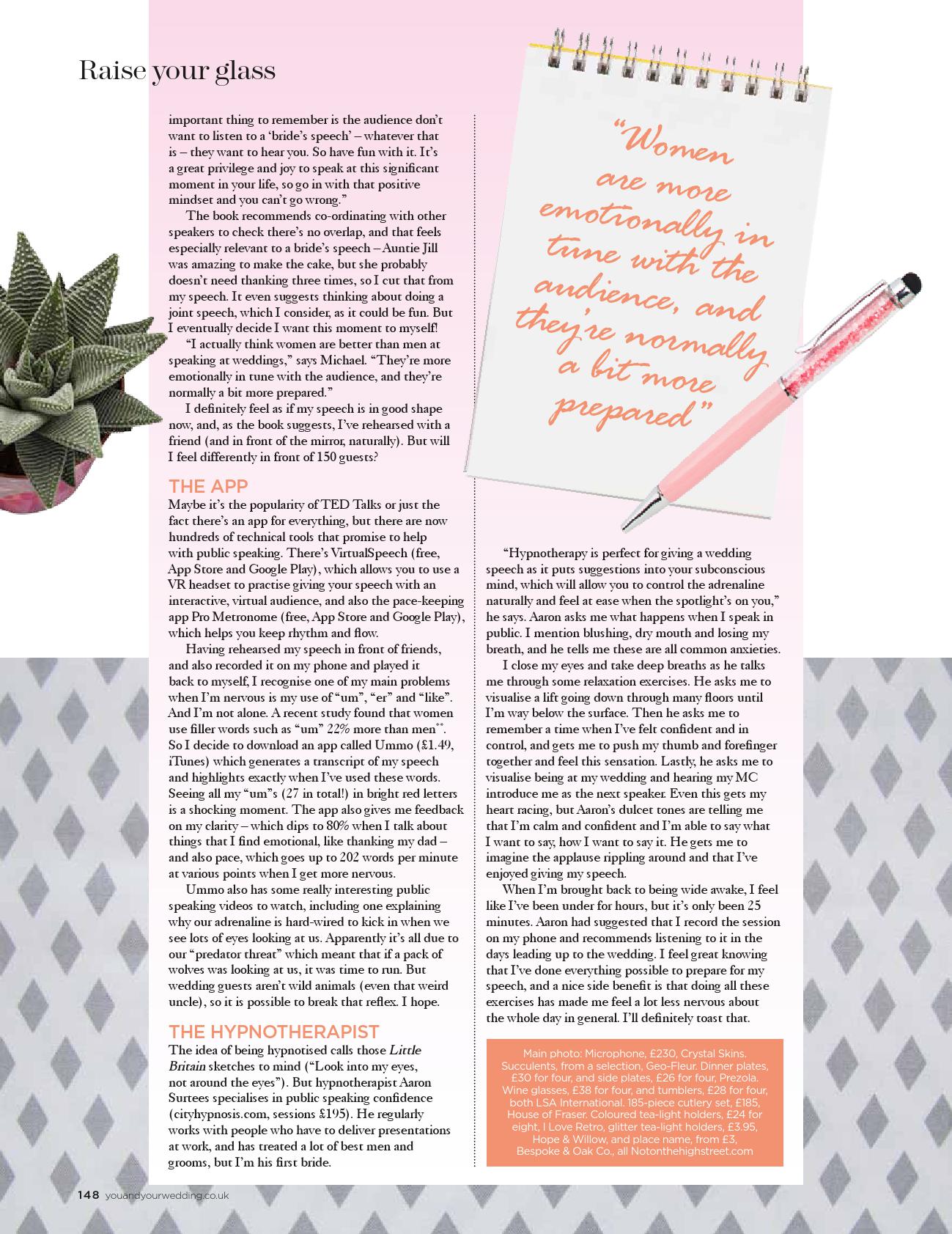More and more brides are stepping up to the mic at their wedding. Bride-to-be Kate Wills trialled various methods for delivering the perfect speech…
Mute brides have always bugged me. I’d watched too many funny, clever, confident female friends struck dumb at their weddings, while their fathers, grooms and best men got to rock the mic instead. I swore that if I ever got married, I’d make a speech. I didn’t want to feel like an ornament, sitting at top table looking pretty – I wanted to be part of it. But now my own wedding is fast-approaching, and there’s just one problem – I’m terrified of public speaking. Heartened by a report which found that more brides than ever are making a speech on their big day, I knew I’d kick myself if I didn’t take this moment, and I hoped I might actually really enjoy it. But I was going to need a little help…
The guru
Considering I write for a living, you’d think penning some words to say at my own wedding would be a breeze. But after staring at a blank word document for hours I got in touch with Robin Bayley aka The Wedding Speech Guru (weddingspeechguru.co.uk, sessions from £250). Bayley has helped hundreds of people compose and deliver a wedding speech, from the nervous father-of-the-bride who contacted him a year before the wedding, to the desperate best man who called him from the pub a few hours before his speech. “From my own research 1 in 5 weddings now has a ‘best woman’” he says. “I’ve also been working with a few brides recently. As the bride, the first thing to remember is the pressure is off as this speech is free from tradition and expectation.” But I feel like the lack of template is the reason I’m struggling, so Bayley suggests focusing on two areas – thanking people and paying tribute to my new husband.
The process starts with Bayley sending me a detailed questionnaire designed to get my speech-writing juices flowing, with memory-jogging questions about me, my family and my boyfriend Sam, such as ‘What were your first impressions of Sam’s family?’ Did you commit any faux pas in front of them?’ Sam’s Jewish and I’m not, so we had a few funny moments at the start of our relationship, like when I tried to bring perfectly-risen cupcakes to Passover (a festival known as the ‘feast without yeast’). Stories like this feel like a nice way to talk about the really mushy stuff – like how welcoming I’ve found Sam’s family and how much I love all their traditions – without being too cheesy.
Bayley also has some great tips for anyone making a wedding speech, like making sure the toast at the end of my speech is something people can repeat, and the importance of a really strong opening which you’ve memorised. He suggests that brides can start by riffing on the old classic ‘My wife and I…’ by starting with ‘My husband and I…’ By the end of our session together I have 3,000 words of material, so he helps me edit it down to 1200 words, which equates to about 10 minutes of actual talking time – “the perfect length” to Bayley’s expert eyes. On paper it’s looking pretty good, now it’s about the delivery.
The book
There are whole libraries full of books for men on how to ace any wedding toast, but I couldn’t find a single book or website devoted solely to speech-happy brides. But Michael Parker’s new book <Unaccustomed As I Am…The Wedding Speech Made Easy> (£9.99, Vermillion), is pleasingly ungendered and has sections on “The Couple”, “The Parents” and “The Best Man/ Best Woman”. It also has really cute illustrations and quotes from everyone from Taylor Swift to TS Eliot – possibly the only time they’ve been in the same book, but they do both like cats.
“I looked at other books on giving wedding speeches and kept coming across expressions like ‘These days the bride might say a few words’,” Michael Parker tells me by phone. “That seemed very old-fashioned and I knew if I’d said that to my two daughters they probably would’ve kicked me.” Hear hear. “The most important thing to remember is the audience don’t want to listen to a ‘Bride’s Speech’ – whatever that is – they want to hear <you>. So have fun with it. It’s a great privilege and joy to speak at this significant moment in your life, so go in with that positive mindset and you can’t go wrong.”
The book recommends coordinating with other speakers to check there’s no overlap, and that feels especially relevant to a bride’s speech – Auntie Jill was amazing to make the cake but she probably doesn’t need thanking three times, so I cut that from my speech. The section on “The Couple” even suggests thinking about doing a joint speech, which I consider as it could be fun. But I eventually decide I want this moment to myself!
“I actually think women are better than men at speaking at weddings,” says Parker. “They’re more emotionally in tune with the audience and they’re normally a bit more prepared.”
I definitely feel like my speech is in good shape now, and as the book suggests I’ve rehearsed with a friend (and in front of the mirror, naturally). But will I feel differently in front of 150 guests?
The app
Maybe it’s the popularity of TED Talks or just the fact there’s an app for everything, but there are now hundreds of technical tools which promise to help with public speaking. There’s VirtualSpeech (free, iTunes), which allows you to use a VR headset to practice giving your speech with an interactive, virtual audience and also the Pace Keeping app ProMetronome (free, iTunes) which was created for stage performers but allows any kind of speaker to keep rhythm and flow.
Having rehearsed my speech in front of friends and also recorded it on my phone and played it back to myself, I recognise one of my main problems when I’m nervous is my use of “um”s, “er”s and “like”s. And I’m not alone. A recent study found that women use filler words like “um” 22% more than men. So I Â decide to download an app called Ummo (free, iTunes) which generates a transcript of my speech and highlights exactly when I’ve used these words. Seeing all my “um”s (27 in total!) in bright red letters is a shocking moment. The app also gives me feedback on my clarity – which dips to 80% when I talk about things that I find emotional, like thanking my dad – and also pace – which goes up to 202 words/ minute at various points when I get more nervous.
Ummo also has some really interesting public speaking videos to watch, including one which explains why our adrenaline is hard-wired to kick in when we see lots of eyes looking at us. Apparently it’s all due to our “predator threat” which meant that if a pack of wolves was looking at us, it was time to run. But wedding guests aren’t wild animals (even that weird uncle) so it is possible to break that reflex. I hope.
The hypnotherapist
The idea of being hypnotised calls to mind <Little Britain> sketches (“Look into my eyes not around the eyes”) and thinking you’re a dog on stage. But hypnotherapist Aaron Surtees (cityhypnosis.com, sessions £195) specialises in public speaking confidence. He regularly works with people who have to deliver presentations at work, and has also treated a lot of best men and grooms, but I’m his first bride.
“Hypnotherapy is perfect for giving a wedding speech as it puts suggestions into your subconscious mind which will allow you to control the adrenaline naturally and feel at ease when the spotlight’s on you,” he says. I feel a little apprehensive as I lie back on a big black leather chair, and Surtees asks me what happens when I speak in public. I mention blushing, dry mouth and losing  my breath and he tells me these are all common anxieties.
I close my eyes and take deep breaths as he talks me through some relaxation exercises. He asks me to visualise a lift and going to down through many floors until I’m way below the surface. Then he asks me to remember a time when I’ve felt confident and in control and gets me to push my thumb and forefinger together and feel this sensation.
Lastly he asks me to visualise being at my wedding and hearing my MC introduce me as the next speaker. Even this gets my heart racing, but Surtees dulcet tones are telling me that I’m calm and confident and I’m able to say what I want to say, how I want to say it. He gets me to imagine the applause rippling around and that I’ve enjoyed giving my speech.
When I’m gradually brought back to being wide awake, I feel like I’ve been under for hours but it’s only been 25 minutes. Surtees had suggested that I record the session on my phone and he recommends listening to it in the days leading up to the wedding. I feel great knowing that I’ve done everything possible to prepare for my speech, and a nice side benefit is that doing all of these exercises has made me feel a lot less nervous about the whole day in general. I’ll definitely toast to that.


